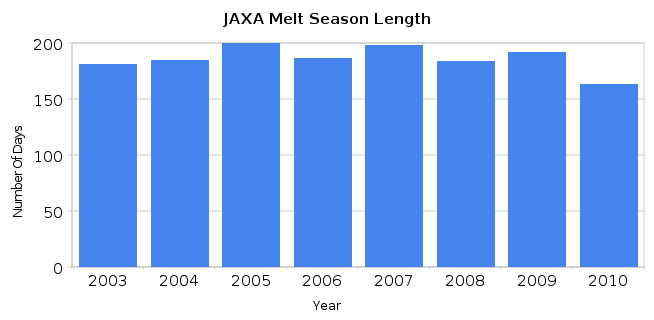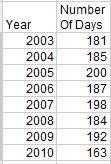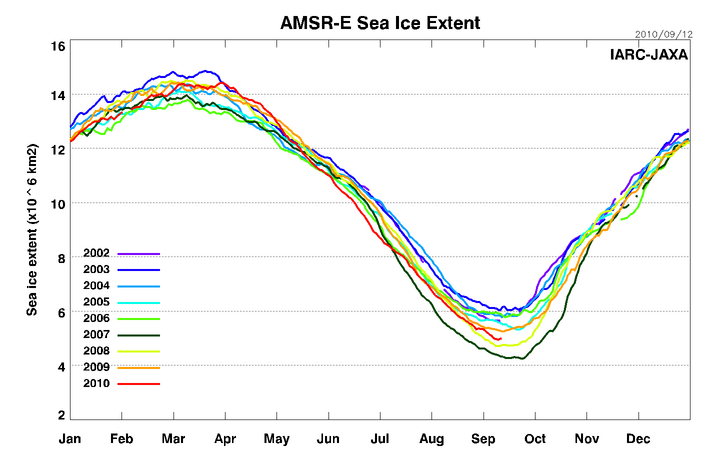It appears that the JAXA extent graph has bottomed out. If so, the melt season (date of the minimum minus the date of the maximum) in 2010 was the shortest in their eight year record, at 163 days. The previous record was 181 days in 2003. The longest melt season was 2005, at 200 days.
The short melt season was due to a some very cold weather in March at lower latitudes, which kept driving extent upwards until the end of the month. The maximum was reached 18 days later than the mean, and the minimum was reached 5 days earlier than the mean.
Mark Serreze at NSIDC wrote in 2008 :
“As the climate warms, the summer melt season lengthens …”
Joe Romm headlined in May :
As Arctic sea ice shrinks faster than 2007, NSIDC director Serreze says, “I think it’s quite possible” we could “break another record this year.”
….
Data from both the Japan Aerospace Exploration Agency (JAXA) and National Snow and Ice Data Center (NSIDC) show Arctic sea ice extent shrinking below the level of 2007 at a rapid pace:
————————————————————————————————
Code here :
#include <string>
#include <vector>
#include <iostream>
#include <sstream>
#include <fstream>
#include <iomanip>
#include <algorithm>
int dayOfYear(int day, int month)
{
int month_length_array[12] = { 31, 28, 31, 30, 31, 30, 31, 31, 30, 31, 30, 31 };
std::vector<int> month_length_vector(month_length_array, month_length_array + 12);
int day_of_year = 0;
for (size_t i = 1; i < month; i++)
{
day_of_year += month_length_vector[i – 1];
}
return(day_of_year + day);
}
int
main(int argc, char** argv)
{
std::string text_file_name = argv[1];
std::ifstream* if_stream = new std::ifstream;
if_stream->open(text_file_name.c_str(), std::ios::in);
char line[256];
int current_year = 0;
float minimum;
float date_of_minimum;
float date_of_maximum;
float maximum;
struct MinMax
{
int year;
int date_of_minimum;
int date_of_maximum;
int length_of_melt_season;
int minimum;
int maximum;
};
std::vector<MinMax*> min_max_vector;
struct MinMax* current = (MinMax*)NULL;
int year;
int month;
int day;
int extent;
int day_of_year = 0;
while ( if_stream->getline(line, 256) )
{
std::string line_string(line);
std::replace( line_string.begin(), line_string.end(), ‘,’, ‘ ‘ );
std::stringstream string_stream(line_string);
string_stream >> month >> day >> year >> extent;
day_of_year = dayOfYear(day, month);
if (extent == -9999)
{
continue;
}
if (year != current_year)
{
if (current)
{
current->date_of_maximum = date_of_maximum;
current->date_of_minimum = date_of_minimum;
current->length_of_melt_season = date_of_minimum – date_of_maximum;
current->minimum = minimum;
current->maximum = maximum;
min_max_vector.push_back(current);
}
current_year = year;
current = new MinMax;
current->year = year;
minimum = INT_MAX;
maximum = INT_MIN;
day_of_year = 0;
}
if (extent < minimum)
{
date_of_minimum = day_of_year;
minimum = extent;
}
if (extent > maximum)
{
date_of_maximum = day_of_year;
maximum = extent;
}
}
current->date_of_maximum = date_of_maximum;
current->date_of_minimum = date_of_minimum;
current->length_of_melt_season = date_of_minimum – date_of_maximum;
current->minimum = minimum;
current->maximum = maximum;
min_max_vector.push_back(current);
size_t number_of_years = min_max_vector.size();
for (size_t i = 0; i < number_of_years; i++)
{
current = min_max_vector[i];
std::cout << current->year << ” ” << current->length_of_melt_season << ” “;
std::cout << current->maximum << ” ” << current->minimum << ” “;
std::cout << current->date_of_maximum << ” ” << current->date_of_minimum << std::endl;
}
delete if_stream;
}





I’m not so sure. I’ve been watching the JAXA numbers for a few weeks usually about 07:00 EST. The latest number is almost always updated later that day so I’m hopeful but not confident. Additionally we only have two consecutive up tick days (assuming that 09/11 holds). I believe three consecutive days is considered the key. Regardless, it looks like we will beat 2007 & 2008 but we’re already below 2009. I was hoping for a third straight recovery year.
The amount of multi-year ice is likely to be higher in spring 2011 than it was in spring 2010. This is a much better metric of “recovery.”
Why?
I’m guessing that it is because spring ice is more likely to be there during the “long, hot, brutal days of summer”. That and the fact that the sun shines allot more in June then September.
By the way JAXA has updated their number from 5,001,406 to 5,005,000. That’s not much change (and to the positive) but I’ve seen them change it more then once in a single day.
This time of year, satellites tend to miss thin new ice, so error correction tends to be upwards. During the summer, satellites mistake meltwater for sea water, so they also need to correct upwards.
It’s just climate.
It looks like there’s been a general shortening trend of melt season since 2005.